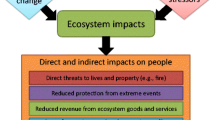Abstract
The long-range outlook for the world’s ecosystems depends on the course taken by global development in the coming decades. Current global trends and ecological dynamics are consistent with very different outcomes, defined by alternative assumptions about the technological, economic, demographic, geopolitical, and social aspects of development and the ways in which institutions, personal and public values, and natural systems may be expected to respond to historically novel stressors. Recent advances in scenario analysis have addressed the dual methodological challenge of exploring these uncertainties in an organized way and determining what would be needed to make the transition to sustainability. This paper reviews global scenario research, setting current efforts in a historical context. It focuses on seven recent studies that are comprehensive, regionally disaggregated, and narratively rich—and thus of greatest relevance to the Millennium Ecosystem Assessment (MA). It summarizes their social visions and the level of quantitative detail used in these exercises. Taken together, this suite of global scenario studies provides a useful platform for the MA by offering insight into the complex factors that drive ecosystem change, estimating the magnitude of regional pressures on ecosystems, sounding the alert on critical uncertainties that could undermine sustainable development, and understanding the importance of institutions and values. But these studies are only a point of departure. The integration of changing ecosystem conditions into global development scenarios, as both effects and causes, is at the cutting edge of scenario analysis. The paper concludes by identifying directions for this research program and suggesting ways that the MA can contribute to this effort.
Similar content being viewed by others

References
J Alcamo R Leemans E Kreileman (Eds) (1998) Global change scenarios of the 21st century: results from the IMAGE 2.1 model Elsevier Kidlington (UK)
B Burrows A Mayne P Newbury (1991) Into the 21st century: a handbook for a sustainable future Adamantine Twickenham (UK)
W Cosgrove F Rijsberman (2000) World Water Vision: making water everybody’s business Earthscan London
Cumming GS, Alcamo J, Sola O, Swart R, Bennett EM, Zurek M. 2005. Are existing global scenarios consistent with ecological feedbacks? Ecosystems 8
InstitutionalAuthorName[CPB] Central Planning Bureau (1992) Scanning the future: a long-term scenario study of the world economy 1990–2015 SDU Publishers The Hague
G Gallopín A Hammond P Raskin R Swart (1997) Branch points: global scenarios and human choice Stockholm Environment Institute Stockholm
A Herrera H Scolnic G Chichilnisky G Gallopín J Hardoy D Mosovich E Oteiza et al. (1976) Catastrophe or new society? A Latin American world model International Development Research Centre Ottawa
InstitutionalAuthorName[IPCC] Intergovernmental Panel on Climate Change (2001) Climate change 2001: mitigation. Third assessment report of the Intergovernmental Panel on Climate Change Cambridge University Press Cambridge (UK)
H Kahn A Weiner (1967) The year 2000: a framework for speculation on the next thirty-three years Macmillan New York
H Kahn W Brown L Martel (1976) The next 200 years: a scenario for America and the world Morrow New York
Kaplan R. 1994. The coming anarchy. Atlantic Monthly 273:44-76
D Meadows DL Meadows J Randers W Behrens (1972) The limits to growth Universe Books New York
M Mesarovic E Pestel (1974) Mankind at the turning point Dutton New York
L Milbrath (1989) Envisioning a sustainable society: learning our way out State University of New York Press Albany (NY)
N Nakićenović J Alcamo G Davis B Vries Particlede J Fenhann S Gaffin K Gregory et al. (2000) Special Report on Emissions Scenarios: a special report of Working Group III of the Intergovernmental Panel on Climate Change Cambridge University Press Cambridge (UK)
InstitutionalAuthorName[OECD] Organisation of Economic Co-operation, Development (2001) OECD environmental outlook OECD Paris
GD Peterson GS Cumming SR Carpenter (2003) ArticleTitleScenario planning: A tool for conservation in an uncertain world Conserv Biol 7 358–66 Occurrence Handle10.1046/j.1523-1739.2003.01491.x
P Raskin (2000) Regional scenarios for environmental sustainability: a review of the literature United Nation Environment Programme Nairobi
P Raskin E Kemp-Benedict (2002) GEO scenario framework background paper for UNEP’s Third Global Environmental Outlook Report United Nation Environment Programme Nairobi
P Raskin G Gallopín P Gutman A Hammond R Swart (1998) Bending the curve: toward global sustainability Stockholm Environment Institute Stockholm
P Raskin C Heaps J Sieber E Kemp-Benedict (1999) PoleStar System manual for version 2000 Stuckholm Environment Institute-Bottom/Tellus Institute Boston
P Raskin T Banuri G Gallopin P Gutman A Hammond R Kates R Swart (2002) Great transition: the promise and lure of the times ahead Stuckholm Environment Institute-Bottom Boston
InstitutionalAuthorName[RIVM] Rijksinstituut voor Volksgezondheid en Milieu (2001) The IMAGE 2.2 implementation of the SRES scenarios: a comprehensive analysis of emissions, climate change and impacts in the 21st century. CD-ROM RIVM Bilthoven (the Netherlands)
P Schwartz (1991) The art of the long view: planning for the future in an uncertain world Doubleday New York
R Swart P Raskin J Robinson (2004) ArticleTitleThe problem of the future: sustainability science and scenario analysis Global Environ Change 14 137–146 Occurrence Handle10.1016/j.gloenvcha.2003.10.002
U Svedin B Aniansson (Eds) (1987) Surprising futures: notes from an international workshop on long-term world development Swedish Council for Planning and Coordination of Research Stockholm
F Toth E Hizsnyik W Clark (Eds) (1989) Scenarios of socioeconomic development for studies of global environmental change: a critical review International Institute for Applied Systems Analysis Laxenburg (Austria)
InstitutionalAuthorName[UNEP] United Nations Environment Programme (2002) Global environmental outlook 3 Earthscan London
P Wack (1985) ArticleTitleScenarios: shooting the rapids Harvard Bus Rev 63 135–50
InstitutionalAuthorName[WBCSD] World Business Council for Sustainable Development (1997) Exploring sustainable development: summary brochure WBCSD Geneva
InstitutionalAuthorName[WWV] World Water Vision Commission Report (2000) A water secure world: vision for water, life and the environment Earthscan London
Author information
Authors and Affiliations
Corresponding author
Rights and permissions
About this article
Cite this article
Raskin, P.D. Global Scenarios: Background Review for the Millennium Ecosystem Assessment. Ecosystems 8, 133–142 (2005). https://doi.org/10.1007/s10021-004-0074-2
Received:
Accepted:
Published:
Issue Date:
DOI: https://doi.org/10.1007/s10021-004-0074-2



